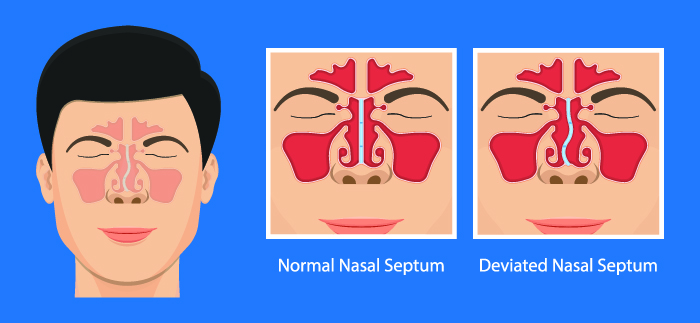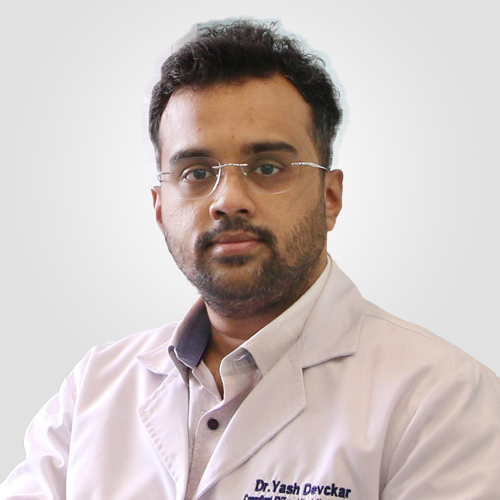Deviated Septum Surgery in Sadashiv Peth, Pune
A deviated septum is a disorder in humans where the thin wall between the nose is displaced to one side. It is pretty common, and you can see many people with one nasal passage smaller than the other because of a deviated septum. To know more about the disorder and the treatment, consult a deviated septum specialist near you.

What Is a Deviated Septum?
The septum is a cartilaginous part of the nose that divides the two nostrils and is commonly located at the center of the nose. However, this septum is not in the center and has a markedly different appearance in some people.
The deviation in the septum leads to a decrease in the size of either of the nostrils. This is not a severe condition until it causes serious breathing problems.
What Are the Symptoms of a Deviated Septum?
- Nasal congestion or pressure
- Snoring problems
- Difficulty in breathing
- Sinus infection
- Bleeding from the nose
- Dried nostrils
- Loud breathing noise during sleep
- Facial pain
What Are the Causes of a Deviated Septum?
A lot of factors can contribute to the formation of a deviated septum. You can either have the condition from your birth or have a deviated septum as the result of an injury. A few other causes can be injuries caused by fighting, sports, or accidents.
When to See a Doctor?
See a doctor right away if you notice any of the following symptoms:
- Pain in the nose
- Blocked nostrils
- Frequent nose bleeds
- Recurring sinus infections
- Breathing problems
Request an appointment at Apollo Spectra Hospitals, Tardeo, Mumbai.
Call 1860 500 2244 to book an appointment.
What Are the Risk Factors That May Cause a Deviated Septum?
- Deviated septum from birth
- Playing sports
- Accidents
- Rhinitis
- Rhinosinusitis
How Is a Deviated Septum Diagnosed?
A doctor can diagnose your deviated septum by looking into the nose. If the doctor is not an ENT specialist, they will refer you to a deviated septum specialist.
The doctor will look for any congestions and complications to understand the seriousness of the condition. They may also ask you some questions about your symptoms and recommend a few physical exams.
What Are the Complications Associated With a Deviated Septum?
- Dry mouth
- Pressure felt on the nose
- Disturbances while sleeping
- Loud breathing while sleeping
- Chronic sinus
- Nose bleeding
How Is a Deviated Septum Treated?
- By managing symptoms: The deviated septum specialist will prescribe medications like:
- Nasal decongestants to decrease congestion, swelling, and pain in the nose
- Antihistamines to relieve you from allergy symptoms like stuffy or runny nose
- Nasal steroid spray like nasal corticosteroids helps reduce swelling and help drainage.
- Surgical procedure: Septoplasty and nose rhinoplasty are the two surgical techniques used to treat a deviated septum.
- Septoplasty is a surgical procedure in which your doctor will try to reposition your septum in the right place. The doctor will remove certain nose parts, take the cartilage out and insert it again inside the nose. A septoplasty can entirely cure the complications caused by a deviated septum.
- Rhinoplasty is a surgical procedure to reshape the shape of the nose.
Conclusions
A deviated septum is a common facial irregularity observed in a few people. A genetic defect or some accidents can cause it. A specialist can quickly reshape your nose or do a septoplasty to treat the condition.
However, your doctor can also treat the complications of a deviated septum by prescribing medications like nasal decongestants, nasal sprays, and antihistamines. Make sure to get yourself tested and diagnosed right away at an ENT hospital near you.
Yes, it will worsen if you don’t get it treated because with age, the nose changes its shape, and eventually, the condition gets severe. You should consult a deviated septum specialist near you to discuss your situation.
It can take 3-6 weeks in some patients, but the recovery depends on your condition.
If a septoplasty is done, the surgery gets over in 60-90 minutes, but if rhinoplasty is also performed along with it, it will take almost 180 minutes for the entire surgery to complete.
Symptoms
Our Doctors
DR. JAYESH RANAWAT
MBBS, MS, DNB, FCPS...
| Experience | : | 16 Yeras Experience |
|---|---|---|
| Speciality | : | ENT, Head and Neck S... | Location | : | Tardeo |
| Timings | : | Available by prior a... |
DR. NINAD SHARAD MULEY
BDS, MDS...
| Experience | : | 9 Yeras Experience |
|---|---|---|
| Speciality | : | Dental and Maxillofa... | Location | : | Chembur |
| Timings | : | Mon - Sat : 9:00 AM ... |
DR. DIPAK DESAI
MBBS, MS, DORL...
| Experience | : | 21 Yeras Experience |
|---|---|---|
| Speciality | : | ENT, Head and Neck S... | Location | : | Tardeo |
| Timings | : | Available by prior a... |
DR. RINAL MODI
BDS...
| Experience | : | 8 Yeras Experience |
|---|---|---|
| Speciality | : | Dental and Maxillofa... | Location | : | Tardeo |
| Timings | : | Mon - Sat : 10:00 AM... |
DR. PRASHANT KEWLE
MS (ENT), DORL...
| Experience | : | 17 Yeras Experience |
|---|---|---|
| Speciality | : | ENT, Head and Neck S... | Location | : | Chembur |
| Timings | : | Mon - Sat : 4:00 PM ... |
DR. KEYUR SHETH
DNB (Med), DNB (Gast...
| Experience | : | 7 Yeras Experience |
|---|---|---|
| Speciality | : | Gastroenterology... | Location | : | Chembur |
| Timings | : | Mon to Fri : 2:00 PM... |
DR. MEENA GAIKWAD
MBBS, MS (ENT)...
| Experience | : | 8 Yeras Experience |
|---|---|---|
| Speciality | : | ENT, Head and Neck S... | Location | : | Chembur |
| Timings | : | Mon - Sat : 6:30 PM ... |
DR. SHRUTI SHARMA
MBBS,MS(ENT)...
| Experience | : | 15 Yeras Experience |
|---|---|---|
| Speciality | : | ENT, Head and Neck S... | Location | : | Tardeo |
| Timings | : | "Mon - Fri : 11:00 A... |
DR. YASH DEVCKAR
MBBS, MS (ENT)...
| Experience | : | 11 Yeras Experience |
|---|---|---|
| Speciality | : | ENT, Head and Neck S... | Location | : | Chembur |
| Timings | : | Mon - Sat : 9:30 AM ... |
DR. ROSHNI NAMBIAR
MBBS, DNB (ENT)...
| Experience | : | 19 Yeras Experience |
|---|---|---|
| Speciality | : | ENT, Head and Neck S... | Location | : | Chembur |
| Timings | : | Mon - Sat : 12:30 PM... |
DR. SHASHIKANT MHASHAL
MBBS, MS (ENT)...
| Experience | : | 22 Yeras Experience |
|---|---|---|
| Speciality | : | ENT, Head and Neck S... | Location | : | Chembur |
| Timings | : | Friday : 8:00 PM to ... |
DR. ANKIT JAIN
MBBS, MS (ENT)...
| Experience | : | 14 Yeras Experience |
|---|---|---|
| Speciality | : | ENT, Head and Neck S... | Location | : | Tardeo |
| Timings | : | Mon, Wed, Fri : 4:00... |
DR. MITUL BHATT
MBBS, MS (ENT), DNB ...
| Experience | : | 12 Yeras Experience |
|---|---|---|
| Speciality | : | ENT, Head and Neck S... | Location | : | Tardeo |
| Timings | : | Mon - Sat : 2:30 PM ... |
DR. GANGA KUDVA
MBBS, MS (ENT) , DNB...
| Experience | : | 12 Yeras Experience |
|---|---|---|
| Speciality | : | ENT, Head and Neck S... | Location | : | Tardeo |
| Timings | : | Available by prior a... |
Our Top Specialities
NOTICE BOARD
CONTACT US
CONTACT US
 Book Appointment
Book Appointment



.jpg)












.svg)
.svg)
.svg)
.svg)








